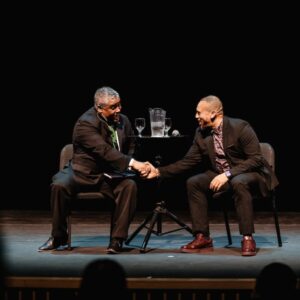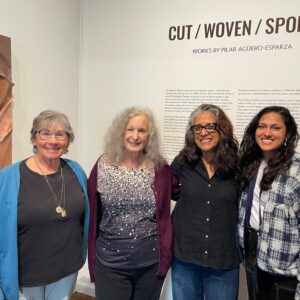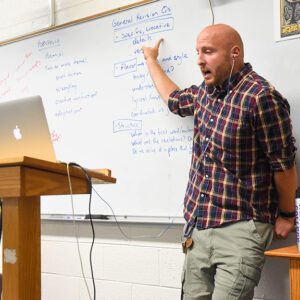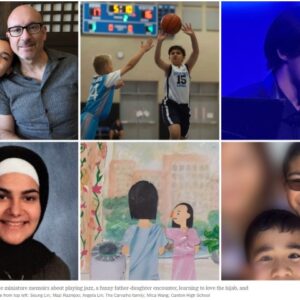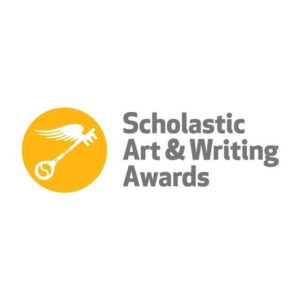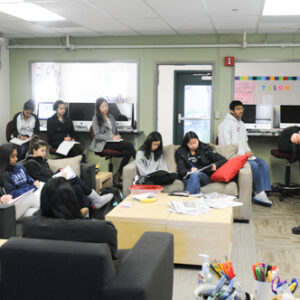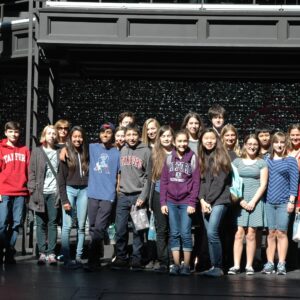This story originally appeared in the Spring/Summer 2023 issue of Harker Magazine. It also also available to read on issuu.
When Avi Gupta began the fifth grade, he wasn’t sure he liked writing. But early in the year, his class studied personal narrative writing for a few weeks. That’s when something shifted.
“The personal narrative unit was where everything came together,” said Gupta, now in grade 7. “It’s where I learned how you want to structure your sentences, structure your paragraphs. It made me understand how writing really works.”
“Avi is a natural storyteller,” said his mother, Tanu Aggarwal. “The process in the elementary school was amazing, because they started in the younger classes with something like, ‘first you brainstorm, then you write a rough draft, you edit it, you get it reviewed, you get it peer reviewed.‘ All those things help. Because of that, his writing has definitely improved.”
The lower school has always had a strong writing program, one that focuses on academic writing: structured essays, exposition and text analysis.
This year, that writing program got even better. A new personal narrative curriculum was integrated into language arts classes for all students in kindergarten through grade 5. Nearly a decade in the making, English teachers have been studying and training in ways to teach the subject, and piloting it in their classrooms. As of this year, the program has been fully implemented in the lower school.
“There’s almost no skill that’s more important than writing,” said Jennifer Gargano, assistant head of school, academic affairs. “When you put yourself out in the world, people determine your education level based on how you write and how you speak. Our students are extremely bright in so many areas. For them to be taken seriously, they have to be able to communicate their knowledge and their skills.”
Significant changes
The difference has been remarkable for students and teachers alike. Learning to describe their personal experiences improves a student’s writing overall. Hearing each other’s stories has made students more empathetic toward their classmates. Teachers get to know their students better when they hear their stories. Teachers also share the writing with their colleagues, which makes them even better teachers.
“Each year, they’re learning a new technique, a new strategy, a new way to make their narrative that much richer,” said Heather Russell, grade 5 English teacher and chair of the English language arts department. “It’s not just telling the story. It’s showing that there’s a deeper meaning, that there’s a significance of why this was a memory. Why did you choose this moment? What does this moment tell us about you, as an individual?
“That’s why I think it’s so valuable. It’s really about hearing the voices of our students, the diversity of our students. It’s giving them a venue to express challenges and loss and how they navigate change. Helping them discover their voice.”
The personal narrative origin story
For nearly a decade, grade 4 and 5 English teacher Annamaria Smitherman has endeavored to bring personal narrative writing to Harker students in a more meaningful way. She has long wanted to do something to help students discover and develop their unique voices.
“I was certain that we could celebrate the diversity of our students while also connecting them through common themes around growing up: facing challenges, loving friends and family, loss of people and things we love, navigating change and the like,” she said. That’s where personal narrative comes in.
“Sometimes, young children have a hard time talking about themselves or their experiences,” said Kristin Giammona, elementary division head. “The way the program scaffolds has definitely helped them with their prewriting, their writing, their editing, all of it. It gives us so many resources to use to get the best writing that we can out of our children.”
The Vegesna Foundation’s Teacher Excellence Program at Harker has supported Smitherman in this exploration since 2015, when she visited a private school in Maine that has a strong writing program. Funding from the Vegesna program enabled her and some of her colleagues to observe at the school. They learned that the methods it was using weren’t quite right for Harker, so they kept looking.
Things really fell into place when Smitherman was awarded a Vegesna grant to visit the Teachers College Reading and Writing Project at Columbia University, under the leadership of Lucy Calkins. What she found was a spiraling writing curriculum that would allow her and her fellow teachers to do what they take pride in – connect with students and coach them individually as they practice a series of specific skills, which are taught sequentially.
“We wanted to allow students to discover their own perspectives on the events of their lives,” Smitherman said. “I piloted the program for one year, and then a few colleagues asked to jump in, and word spread. And, as they say at the Reading and Writing Project, off we went!”
Several more teachers trained with Teachers College, in person and then virtually during the pandemic. Then in fall 2022, a trainer from Teachers College came to Harker and taught the curriculum to all lower school teachers.
“We went into this very intentionally and very thoughtfully,” Gargano said, explaining that the overall goal was to have common vocabulary around the K-5 reading programs, and the Harker faculty didn’t want to rush the process. “We were continually meeting and reflecting and saying, ‘We know there’s good stuff here. But how do we make it really accessible and right for The Harker School and for our language arts program?’”
“A sense of pride”
Fine-tuned to Harker’s specific requirements, the classes today are based on students studying both personal and fictional narrative. The units are four to six weeks at the beginning of each fall. “We agreed to do it at the beginning of the year, because we felt it was so foundational to all the other writing that we do,” said Russell, adding that each year builds on the previous year.
“It really starts at the beginning of understanding the story structure, the story arc,”she explained. “We’re teaching them how to tell their story in a way that keeps drawing the reader in and doesn’t give it away in the beginning – things like flashbacks, flash forwards and a lot of other writing techniques. Every year they build on the craft of narrative writing.”
The unit uses a workshop approach, which means students are given short lessons and lots of time to write. The teachers confer with them and then the students make revisions to their work. There’s a lot of conversation about their writing and a lot of individuality. They also read their work to each other.
That moment can be very moving, said Smitherman, and it’s an important aspect of a Harker education.
“It is so important for our students, as they head out to make a difference and a change in the world, that they come from a place of empathy, a place of understanding that everyone has a story to tell, and everyone deserves a place at the table to tell their story,” she said. “To know that their first idea may not be their best idea, and that all ideas need revision and refining; to develop the patience and the energy to do that work; to be inclusive, in terms of the stories that they want to hear and the stories that they need to tell us – all of that is so important.
“They have a sense of pride when they share their stories,” said Russell. “It’s the unfolding not only of what happened on the outside, but what was happening on the inside for them. Having a voice and a venue for that is really empowering. It helps them feel heard and seen and known.”
Everyone is trying to find their own voice, said Gargano, especially adolescents, especially fifth graders
“Increasingly every year, we’re noticing students wanting to share their thoughts on certain topics, and wanting people to hear their voice as it relates to whatever topics they’re passionate about,” she said. “The personal narrative project is wonderful because we want our students to be able to make impacts in the world. And in order for that to happen, they have to be able to develop their own voice.”
Sasha Nyary is a writer and editor living in Maine whose work can be found at sashanyary.com.



